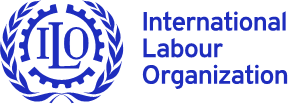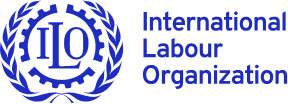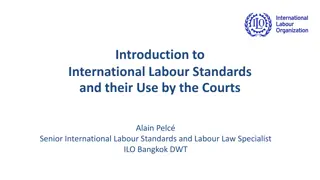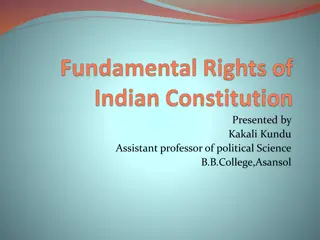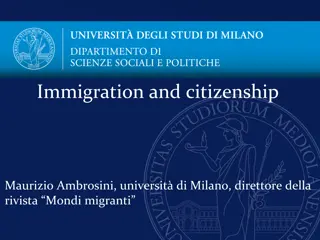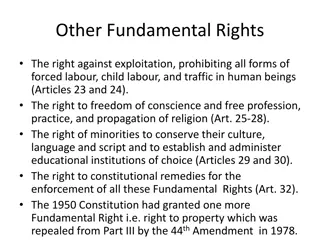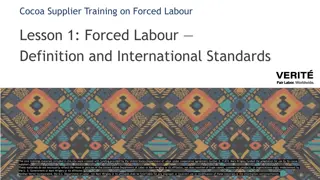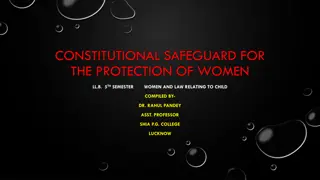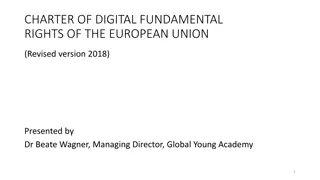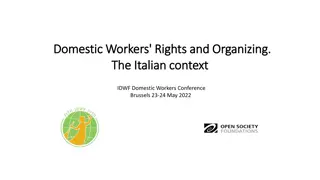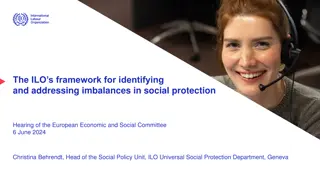ILO Fundamental Principles and Rights at Work
Explore the 5 fundamental principles and rights at work outlined by the ILO, emphasizing social justice and decent work. Delve into how these principles connect with ILO conventions and discuss challenges in their application to Pacific Island Countries.
Download Presentation

Please find below an Image/Link to download the presentation.
The content on the website is provided AS IS for your information and personal use only. It may not be sold, licensed, or shared on other websites without obtaining consent from the author.If you encounter any issues during the download, it is possible that the publisher has removed the file from their server.
You are allowed to download the files provided on this website for personal or commercial use, subject to the condition that they are used lawfully. All files are the property of their respective owners.
The content on the website is provided AS IS for your information and personal use only. It may not be sold, licensed, or shared on other websites without obtaining consent from the author.
E N D
Presentation Transcript
ILO Fundamental Principles and Rights at Work Session 4 ILO Subregional Labour Law Training Workshop Nadi, Fjii Tuesday 7 November 2023
2 Session Objectives To consolidate participants understanding of the Fundamental Principles and Rights at Work (FPRW) To discuss how the FPRW relate to ILO Conventions (and Protocols) To encourage participants to engage directly with Fundamental Conventions and to discuss challenges in their application to the Pacific Island Countries. Advancing social justice, promoting decent work
3 What are the Fundamental Principles and Rights at Work? The 1998 Declaration of Fundamental Principles and Rights at Work identified four principles that are considered fundamental because they protect basic workers rights. All ILO member States have an obligation to respect, to promote and to realise these rights. This obligation arises from the very fact of membership of the Organization and applies even if the state has not ratified the relevant Conventions. In 2002, the ILO added a fifth principle to this list. Advancing social justice, promoting decent work
4 There are five Fundamental Principles and Rights at Work: 1. Freedom of association and the effective recognition of the right to collective bargaining 2. The elimination of all forms of forced or compulsory labour 3. The effective abolition of child labour 4. The elimination of discrimination in respect of employment and occupation; and 5. A safe and healthy work environment Advancing social justice, promoting decent work NB Manually place ilo.org device in front of image
5 How does the ILO promote the Declaration on Fundamental Principles and Rights at Work? The 1998 Declaration includes a follow-up with three elements: 1. Member States are required to submit annual reports for all of the fundamental rights to which they have not ratified the corresponding instruments. The reports are examined by the Governing Body in an annual review. 2. Each year the ILO produces a Global Report on one of the fundamental principles and rights at work. This report informs the recurrent discussion at the Conference on the needs of the Members, the ILO action undertaken, and the results achieved in the promotion of the fundamental principles and rights at work. 3. Development Cooperation Projects are another way that the ILO seeks to promote the Declaration as these projects are designed to address identifiable needs in relation to the Declaration and to strengthen local capacities thereby translating principles into practice. Advancing social justice, promoting decent work
6 The Fundamental Principles and Rights at Work are one of the four strategic objectives central to achieving social justice through decent work The ILO s Decent Work agenda includes: Promoting full, productive, and freely chosen employment Social protection Social dialogue Realizing fundamental principles and rights at work. Advancing social justice, promoting decent work
7 The Fundamental Principles and Rights at Work are underpinned by eleven fundamental Conventions C029 - Forced Labour Convention, 1930 (No. 29) and P029 - Protocol of 2014 to the Forced Labour Convention, 1930 C111 - Discrimination (Employment and Occupation) Convention, 1958 (No. 111) C138 - Minimum Age Convention, 1973 (No. 138) C087 - Freedom of Association and Protection of the Right to Organise Convention, 1948 (No. 87) C155 - Occupational Safety and Health Convention, 1981 (No. 155) C098 - Right to Organise and Collective Bargaining Convention, 1949 (No. 98) C182 - Worst Forms of Child Labour Convention, 1999 (No. 182) C100 - Equal Remuneration Convention, 1951 (No. 100) C105 - Abolition of Forced Labour Convention, 1957 (No. 105) C187 - Promotional Framework for Occupational Safety and Health Convention, 2006 (No. 187) Advancing social justice, promoting decent work
8 Four Governance (or Priority) instruments The ILO has also identified four Conventions as governance (or priority) instruments. Member States are encouraged to ratify these because of their importance to the functioning of the ILS system: C081 Labour Inspection Convention, 1947 (No. 81) C122 Employment Policy Convention, 1964 (No. 122) C129 Labour Inspection (Agriculture) Convention, 1969 (No. 129) C144 Tripartite Consultation (International Labour Standards) Convention, 1976 (No. 144) Advancing social justice, promoting decent work
9 Global ratification of the ILO s Fundamental Instruments and Governance Conventions Source: Normlex Advancing social justice, promoting decent work
10 Ratification of ILO Fundamental Instruments in the Pacific Freedom of association Forced labour Discrimination Child labour Occupational safety & health C087 C098 CO29 PO29 C105 C100 C111 C138 C182 C155 C187 Cook Islands 2015 2015 2018 Fiji 2002 1974 1974 1974 2002 2002 2002 2002 2008 Kiribati 2000 2000 2000 2000 2009 2009 2009 2009 Marshall Islands 2019 Palau 2019 PNG 2000 1976 1976 1976 2000 2000 2000 2000 Samoa 2008 2008 2008 2008 2008 2008 2008 2008 Solomon Islands 2012 2012 1985 2012 2012 2012 2013 2012 Tonga 2020 Tuvalu 2019 Vanuatu 2006 2006 2006 2006 2006 2006 2019 2006 Advancing social justice, promoting decent work
11 Ratification of ILO Governance Conventions in the Pacific Labour Inspection Employment Policy Tripartite Consultation C081 C129 C122 144 Cook Islands 2018 Fiji 2008 2010 2010 1998 Kiribati 2000 2009 Marshall Islands Palau PNG 1976 1991 Samoa 2008 2008 Solomon Islands 1985 Tonga Tuvalu Vanuatu 2006 2006 2006 Advancing social justice, promoting decent work
12 Group work activity Instructions: Each small group will be assigned to ONE of the Fundamental Principles and Rights at Work. Your group will be given copies of the relevant Conventions (and Protocols). Work together to answer the following questions. Be prepared to briefly explain your answers to all workshop participants. 1. What is the main purpose(s) of the conventions? 2. What are the key terms used in the conventions and how are these defined? 3. What do you think are some of the challenges or obstacles to realising these rights for Pacific Island Countries? Note: these challenges can relate to law and/or practice. NB Manually place ilo.org device in front of image
13 Suggested resources ILO, Declaration on Fundamental Principles and Rights at Work and its Follow-up ILO Freedom of Association and Collective Bargaining and Labour Relations ILO, Forced Labour, Modern Slavery and Human Trafficking ILO, Child Labour ILO, Equality and Discrimination ILO, Safety and Health at Work Advancing social justice, promoting decent work
14 Reflections and feedback on Day 1 What did you find most interesting today? What would you liked to have learnt more about? What would you liked to have had more time to discuss? Pace of learning? Level of detail? Advancing social justice, promoting decent work
Thank you and enjoy your evening!
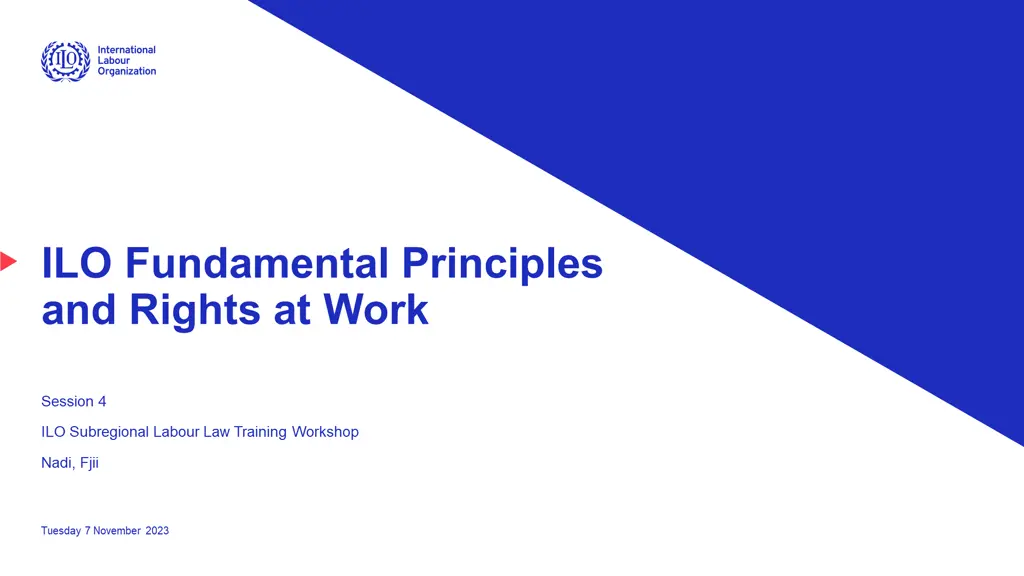
 undefined
undefined
